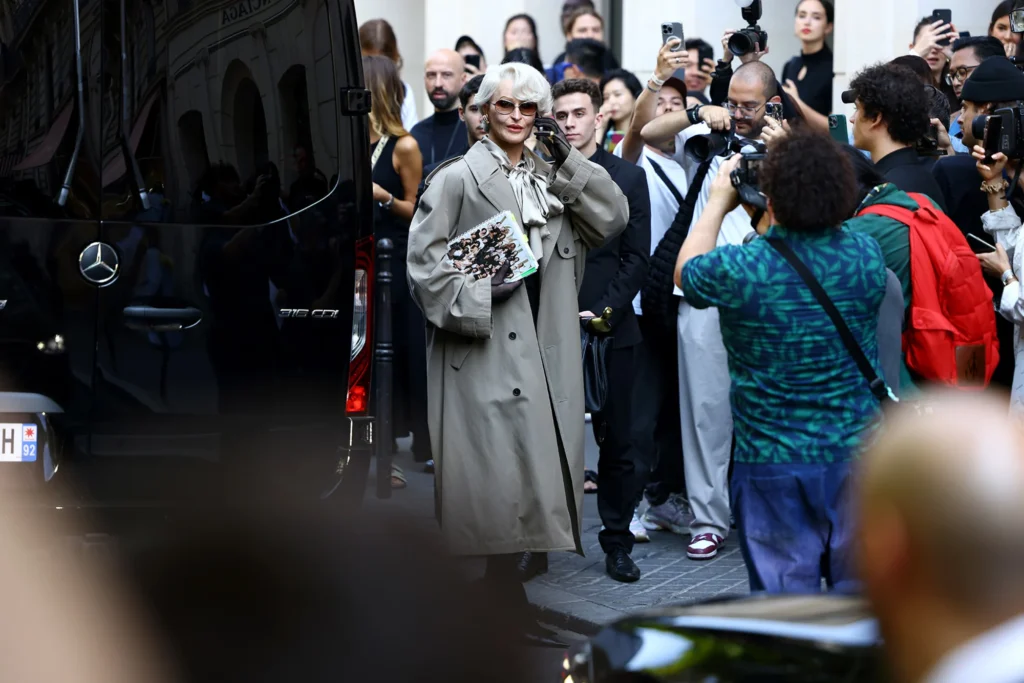
Since the 19th century, haute couture has been bringing together both ancient craftsmanship and the evolving needs of clients, as social backdrops shift and change, aiming to provide a rarefied elegance for the happy few who can afford it. “Couture serves to maintain France’s excellency on a world map, both in terms of creation and know-how, also serving as a conservatory of traditions inherited from as far back as Louis XIV” explained Alice Litscher, professor at Paris’s Institut Français de la Mode in an interview.
In the wake of last week’s Haute Couture Fashion Week and in the midst of the decisive French elections, a general sense of unrest is palpable in the country. Even though politics have been increasingly present on the ready-to-wear runways, the couture collections reflect focus back on the garments, offering quiet excellence for some, and a — much-needed — space for fantasy for others.
Practical reality
A few weeks after Chanel announced the departure of creative director Virginie Viard (who took over Karl Lagerfeld’s position in 2019), the house unveiled a new collection — albeit designed by the studio. Presented in the grandiose Opera Garnier, it explored elegance in a hushed, restrained manner, safely building on the well-established, transgenerational style vocabulary of the house: Richly embroidered and bejeweled pastel tweeds, skirt-suits embellished with ruffled sleeves, long dress-coats, hair pulled back with oversized black bows and, fittingly, considering the venue, opera capes aimed at a clientele who travels, dines, but might not cherish social-media-ready pieces.
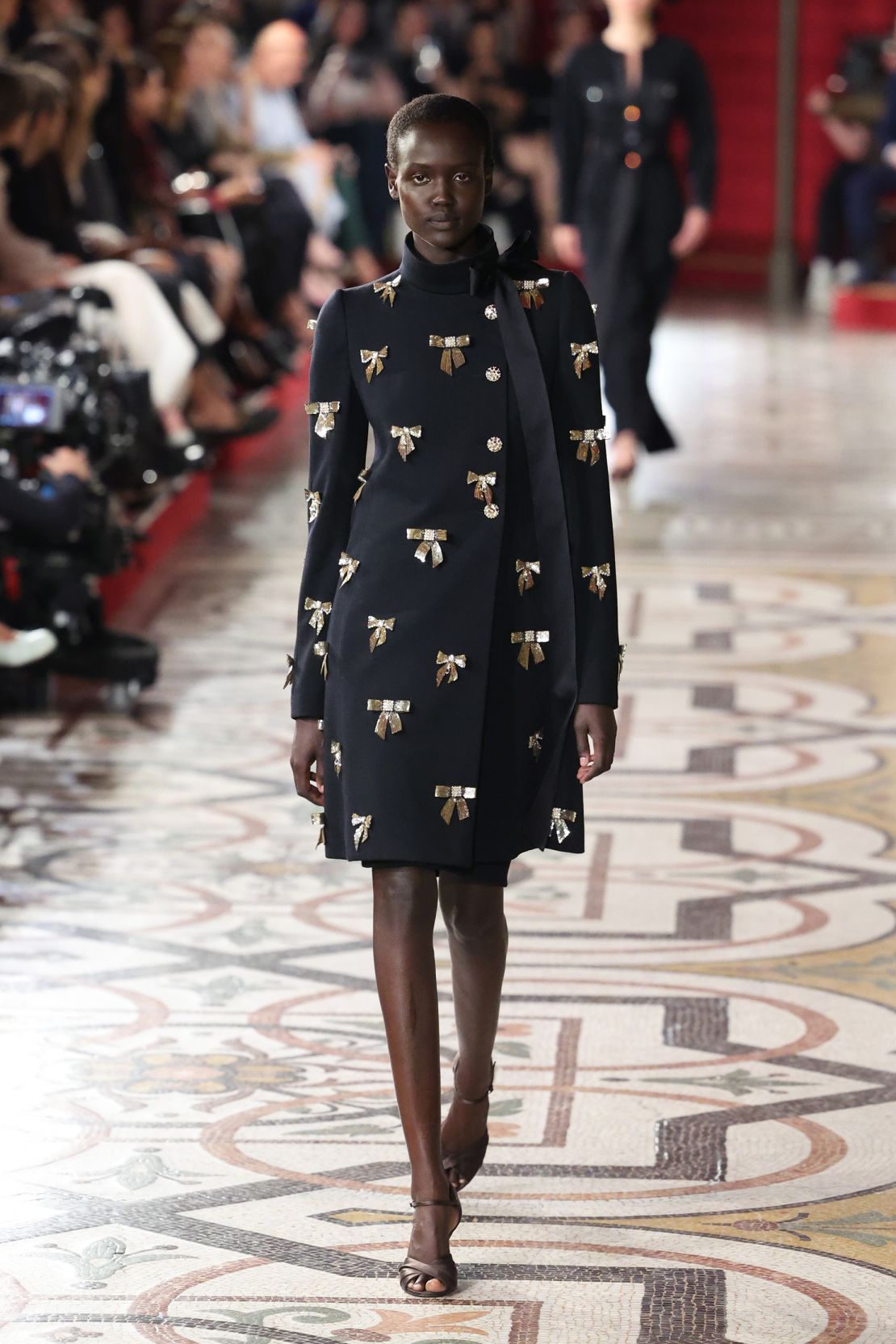
Without a creative director, Chanel’s latest couture show was designed in-house by a team. Peter White/Getty Images
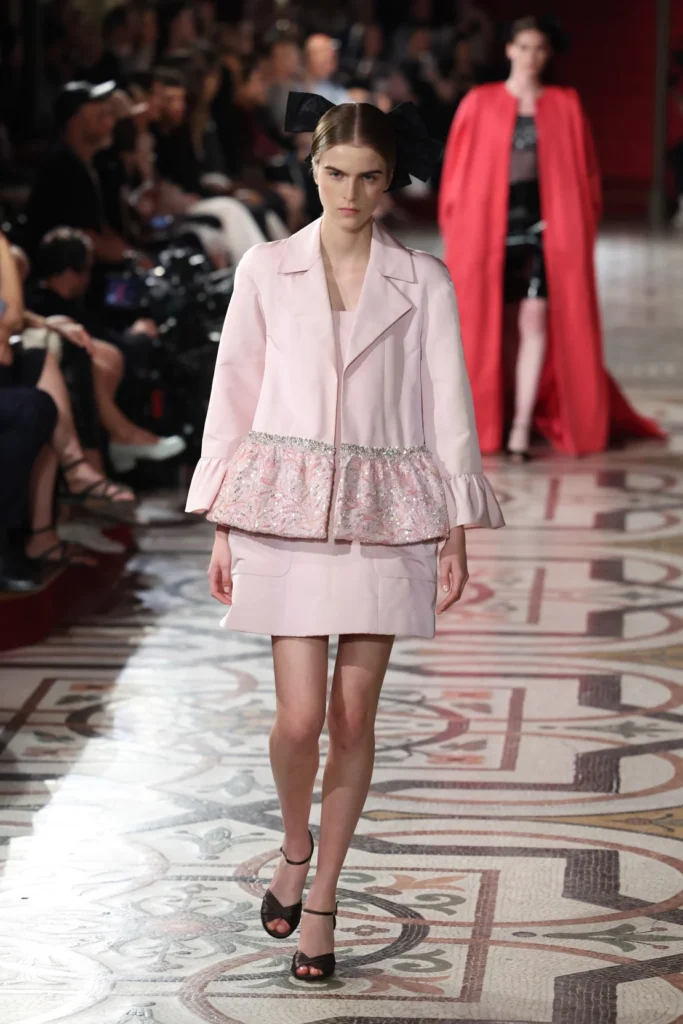
At Patou, the “Rose” collection also suggested a quiet sense of elevation. “This season, I want the Patou woman to be committed, but not necessarily to have the appearance of her commitment… I want her to be fresh before anything,” said creative director Guillaume Henry backstage — perhaps suggesting a move away from the performative activism of recent years. He showcased candy and floral toned daily pieces, tailored denim, functional knitwear, shirt dresses, a play on accessories with neck scarves and gold detailing, saying his work at Patou is “the alliance of elegance, form, simplicity and joy.” As show notes underline, this era is a sensible one: “Patou’s Rose is a collection grounded in reality: a practical one.”
Entering their Villain Era
Swiss psychoanalyst Carl Jung developed the concept of a “shadow self,” the dark facet to every identity: “One does not become enlightened by imagining figures of light, but by making the darkness conscious,” the philosopher wrote. That notion, also known in modern parlance as “entering a villain era” has become surprisingly popular on TikTok, and also ran through several collections.
At Charles de Vilmorin, for a collection entitled “Rêveuse Bourgeoise” (Dreamy Bourgeoise), the show was set up as a play, filled with visual elements fit for fairy tales or “commedia dell’arte” (Italian comedy) plays: a rodent mask, feathers aflame, drapes and capes; each seeming to evoke a grandiose baddie fit for a historical drama. Gowns with the flair of theater costumes (a distinct departure from his ready-to-wear garments) turned haute couture into an escape from reality.
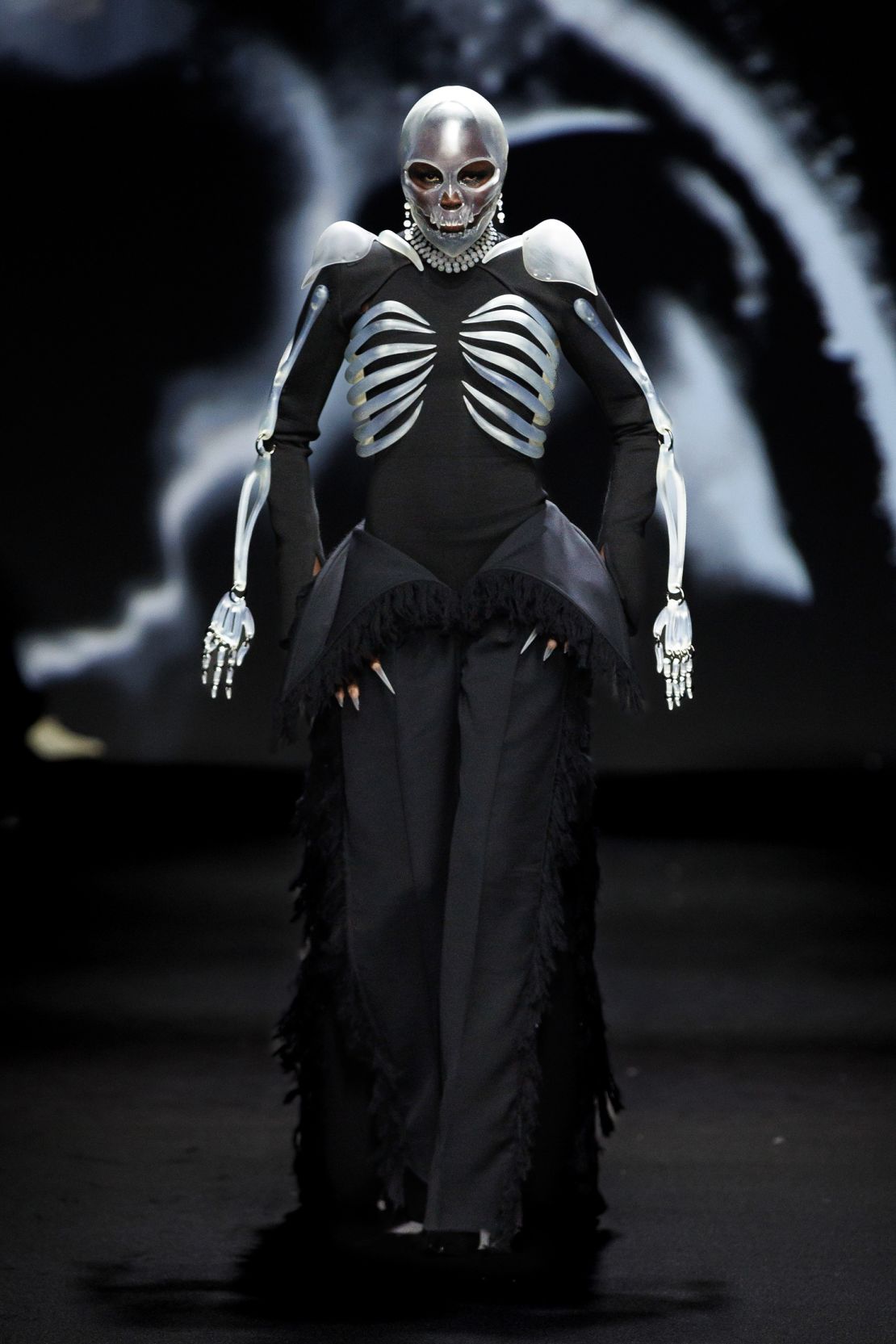
Skull masks were a morbid conclusion to Robert Wun’s sartorial musing on the lifecycle. Courtesy Robert Wun
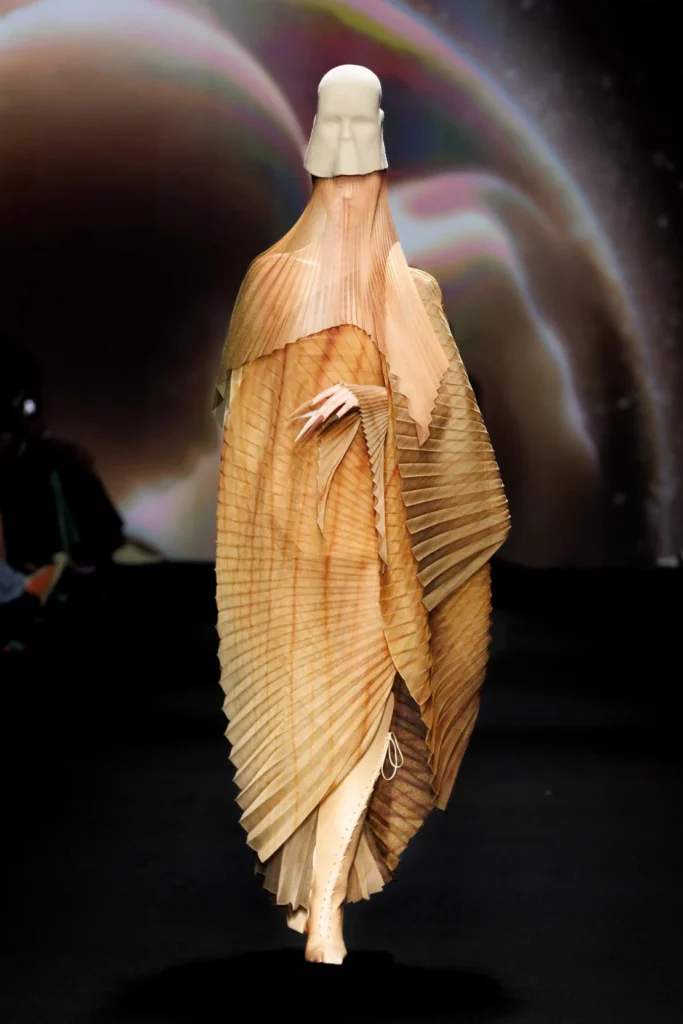
At Robert Wun, on the other hand, each silhouette evolved to a different element. For his tenth anniversary, the designer presented a collection revolving around time, showing cycles of life, metamorphosis, death even; playing with the darker facets of the human experience (including a full skull mask). Decaying flowers, flesh, bones and skulls were all referenced in the collection and textiles, celebrating the multifaceted, transient nature of life.
Science meets nature
For some designers, couture is also a laboratory of experimentation — including Iris Van Herpen, who combined savoir-faire in areas including technology, science and art.
The designer showed aerial sculptures featuring models embedded in the garments and hung to the wall. The collection also included pieces replicating the effects of waves on the sand and sea, dresses that played with a gradient of pearls (some sculpted with a heat gun) and a process fusing organza with 3D printing and lace. These creations are the result of a discussion with French chemist Emmanuel Farge from Institut Marie Curie: “about the primal organisms within the sea 700 million years ago and how they have changed our senses (and what we) experience today” said the designer during the presentation, elaborating upon how nature informs her sensitivity and creative eye.
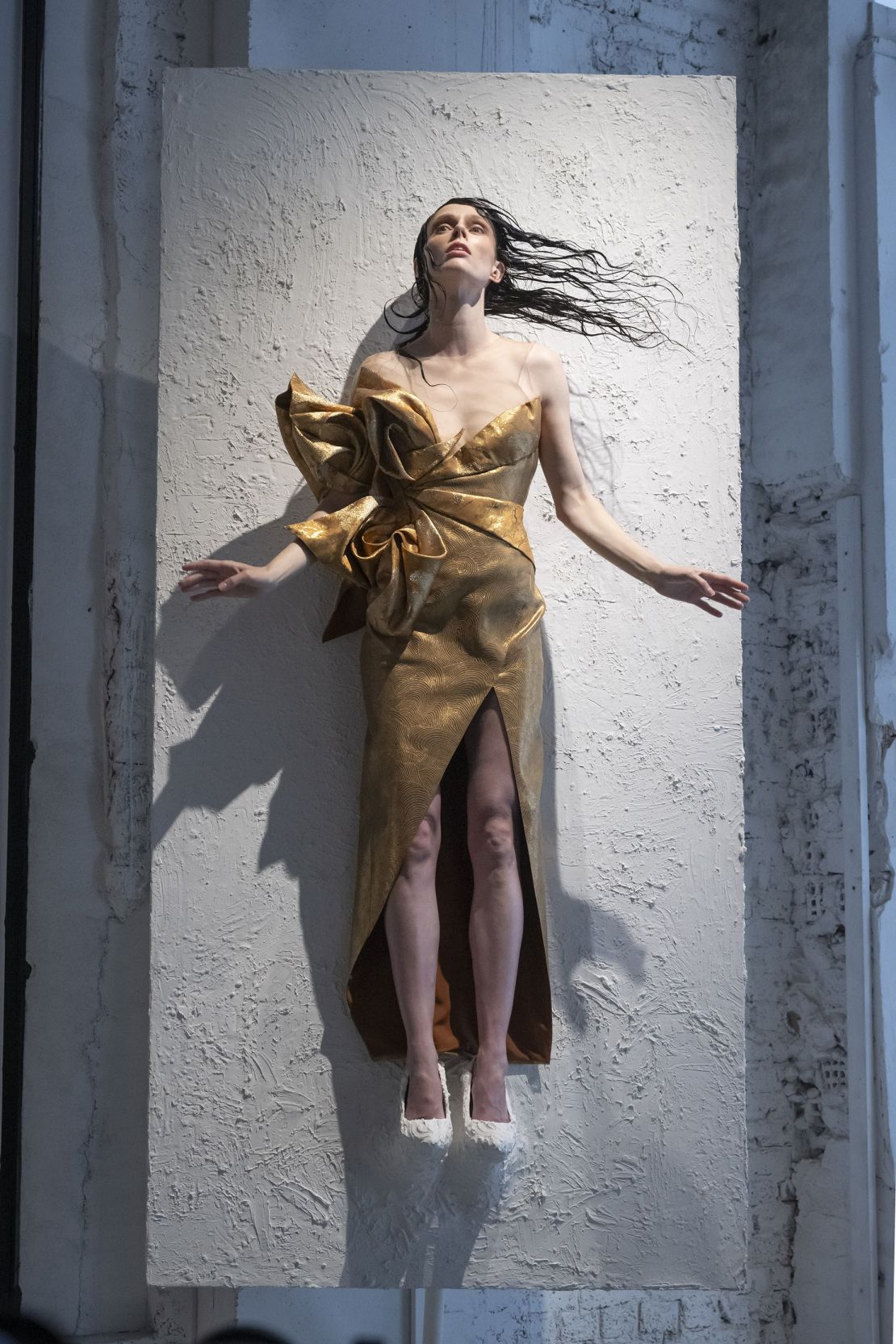
Models at the Iris van Herpen show were mounted to the wall. Victor Virgile/Gamma-Rapho/Getty Images
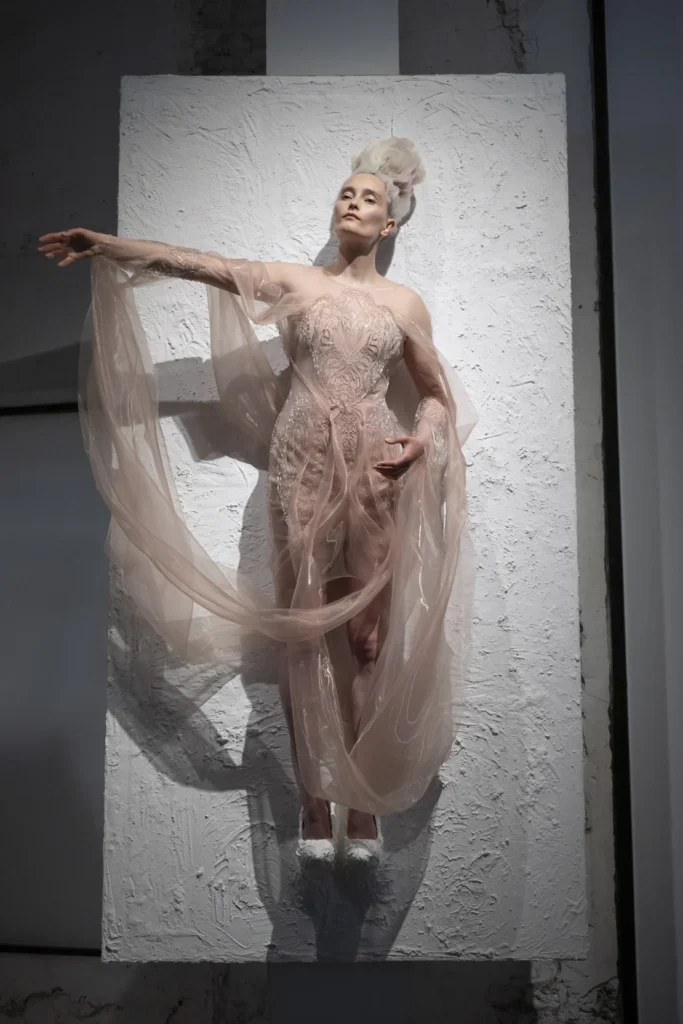
In a similar vein, ArdAzAei explored how geometry and mathematics reveal rhythms of nature, imagined by Bahareh Ardakani, founder and artistic director of the house. She played with some notions of quantum physics and their potential visual impact, and explored how multiple dimensions of string theory, laid flat, can look like flower petals. This was materialized in silk and satin petals on envelope skirts, fishtailed gowns, both geometric and natural, crystals arranged in floral compositions and via the use of double embroidery for a “big bang effect of light exploding from a dress” she said.
Conceptual couture
Viktor and Rolf’s “Haute Abstraction” collection looked, as show notes pointed out, to “express a certain absurdism.” Evoking their “Atomic Bomb” collection from 1998, it played with geometrical shapes, squares and spheres, both childlike and conceptual. “We were thinking of something abstract, like boxes, cubes, balls, and combining them with the human body. When we are in the mood for abstraction, we get a feeling of freedom… There is no interpretation, but a moment of space,” said the duo backstage, adding that this was achieved in “very couture-oriented materials” such as silk duchesse, Lurex and jacquard.
ADVERTISING
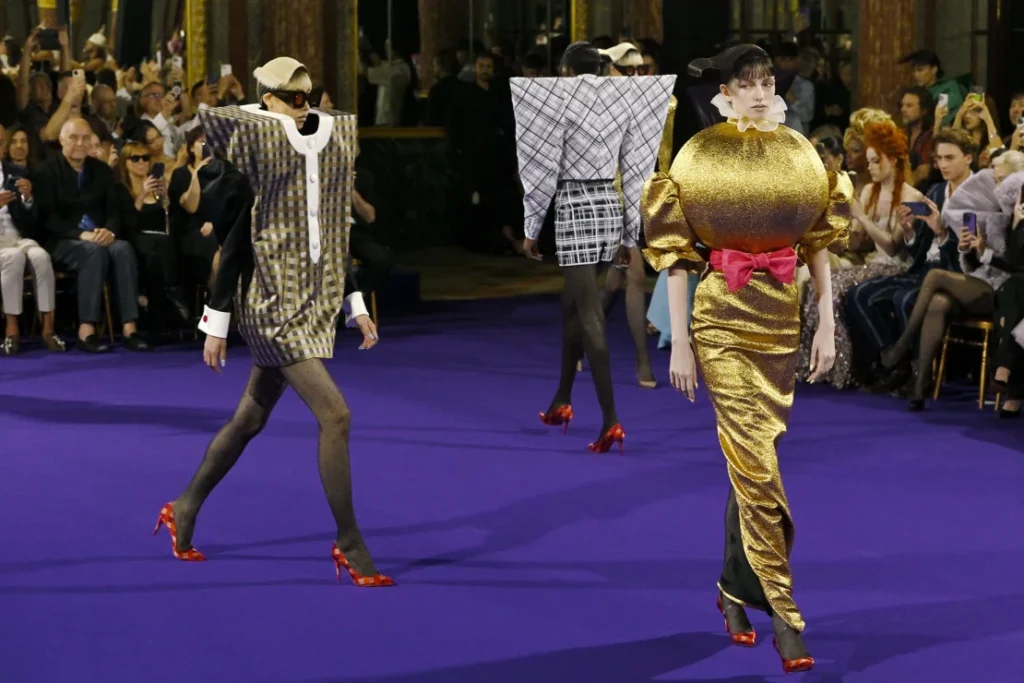
In a different vein, designer Rahul Mishra’s collection, “Aura,” quoted mysticism and the universe for a spiritual, experimental take on fashion. “It’s…all about creating something intangible, something we know exists, but we cannot see” he said backstage. The statuesque, surrealist silhouettes were created with metal structures and glass elements, all contrasting with embellishment and hand embroidery, and all made in India, where the designer lives. The color black used throughout the pieces designates “a condensation of all colors, mystery, infinity,” he explained.
Sporty elevation
With the approach of the Olympic Games, Dior jumped on the occasion “This défilé represents an extraordinary opportunity to combine couture and sportswear with classicism, rebellion, collective energy” the show notes report, and in front of a fresco of women athletes, the show paid tribute to “sportives,” with peplum elements, draping, silk dresses, skirts that revealed draped trousers, as well as moiré jacquard, for a sporty, effect and sense of a body in motion.
For Balenciaga, (also notable for drag queen Alexis Stone’s appearance impersonating Miranda Priestley from 2006 movie “The Devil Wears Prada”), the show was an occasion to merge founder Cristobal Balenciaga’s DNA with “a tribute to subculture codes,” including a hand-dyed faux fur coat in synthetic hair; a knitted, embroidered goth maxi dress featuring black upcycled beads and jackets worn tied around the hips reworked into trousers — all elevating the often mundane.
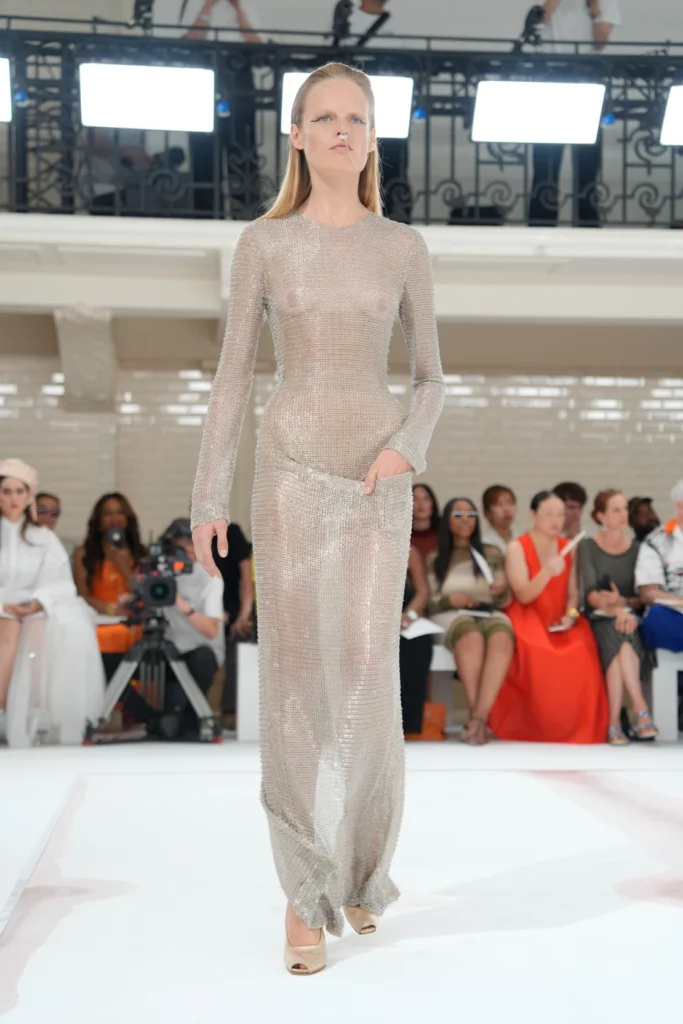
And, as every year, Jean-Paul Gaultier invited a new designer to present under his name. This time head of Courrèges Nicolas Di Felice, known for his sporty, techno-inspired wear, showed a minimalist collection, evoking a sporty, contemporary life-gone-couture. This included a sheath dress in tulle held together with 42,000 hooks and a trompe-l’œil dress, each model with sheathed face, asking, perhaps, for anonymity… Something scarce in 2024.


